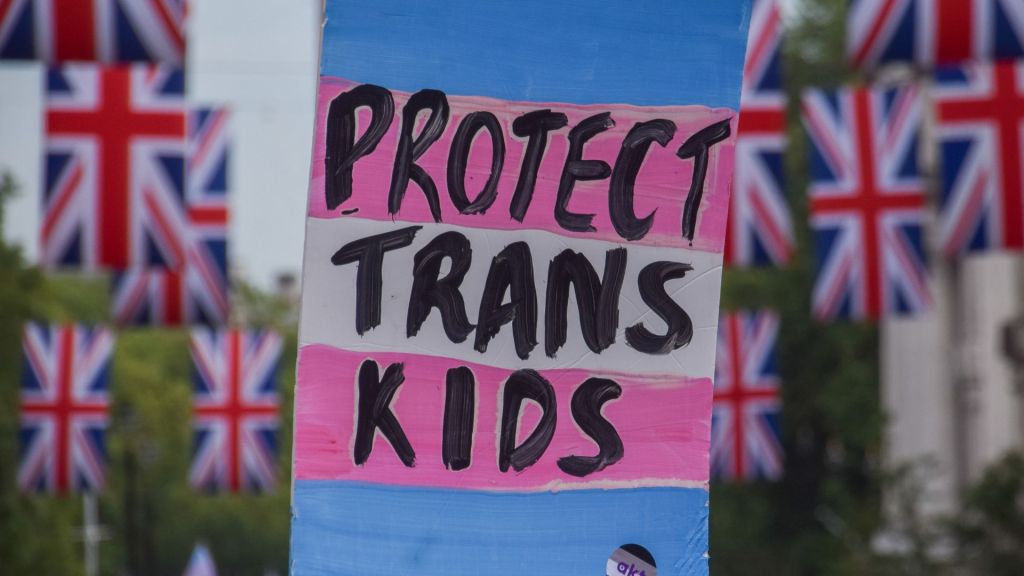The climate crisis will create 1.2 billion refugees. LGBTQ+ people will be especially affected.
An estimated 1.2 billion people could be forced to migrate by 2050 due to extreme weather and natural disasters related to climate change. The hardships of relocating and sharing limited survival resources will fall hardest on LGBTQ+ climate refugees, numerous experts say.
In 2023, London’s Pride parade was briefly halted by a small group of LGBTQ+ activists with U.K.-based climate justice coalition Just Stop Oil protesting the event’s inclusion of floats and sponsorships from high polluting industries.
Ahead of their demonstration, the LGBTQ+ supporters of Just Stop Oil released a statement explaining that they would take action to oppose the government’s continued development of new fossil fuel projects in the face of scientific consensus that such projects threaten “the collapse of our food systems and the breakdown of ordered society.”
The climate crisis, they wrote, “has already killed, and made homeless, millions of people including many LGBTQ+ people.”
“Due to their position at the margins of society, LGBTQI+ people are especially vulnerable.”Climate campaigner, Lily O’Mara
“In the coming decades, hundreds of millions of people are likely to be forced from their homes as conditions become unsuitable for human survival,” the statement continued. “It is queer people, and particularly queer people of colour in the global south, who are suffering first in this accelerating social breakdown.”
The activists at the 2023 London Pride parade were just a handful of voices in a growing chorus raising the alarm about climate displacement and the unique impact it will have on LGBTQ+ people.
In 2020, the Institute for Economics & Peace’s inaugural Ecological Threat Register estimated that by 2050, 1.2 billion people could be displaced around the world due to the effects of rising global temperatures and resultant environmental disasters and political upheaval.
Already, according to the United Nations High Commissioner for Refugees(UNHCR), an annual average of 21.5 million people around the world were displaced from their homes by floods, storms, wildfires, extreme temperature, and other weather-related catastrophes between 2008 and 2016.
As the Center for Climate and Security notes, climate change has been widely described, including by the UNHCR, as a “threat multiplier,” exacerbating risk both for people in already unstable regions and for the socio-economically disadvantaged.
LGBTQ+ people who are forced to migrate from climate-vulnerable areas are similarly likely to face discrimination and harassment on their journey to and in refugee camps.
As writer and researcher Lily O’Mara noted in a 2023 piece for Earth.org, “Due to their position at the margins of society, LGBTQI+ people are especially vulnerable” to the widening inequalities that will inevitably result from increased climate catastrophe, with queer women and LGBTQ+ people of color bearing the brunt.
The risks for LGBTQ+ people are manifold and intersectional
A 2024 report from the Williams Institute found that gay and bi couples in the United States are more likely to live in coastal areas and cities, as well as in counties with an increased risk of adverse climate change effects, including extreme cold, heat waves, excessive precipitation, and dry conditions.
These couples are also more likely to live in areas with poorer infrastructure and access to resources, which means they’re “less prepared to respond and adapt to natural hazards and other climate disruptions,” the report said.
As Eoin Jackson explained in a 2023 piece for the Harvard International Law Journal, many countries in regions that will likely see the most immediate impact of climate change — Northern Africa, Southeast Asia, the Middle East — already have poor track records on LGBTQ+ rights.
Both Jackson and O’Mara warn that in these regions, religious leaders could likely blame LGBTQ+ people for climate-related crises. Jackson cites LGBTQ+ people being blamed for outbreaks of COVID-19 in Nigeria, Liberia, and Zimbabwe, while O’Mara cites religious leaders in New Zealand, Malaysia, Israel, Haiti, and even the U.S. blaming sexual minorities for earthquakes and hurricanes. As climate catastrophes increase, LGBTQ+ people will likely be forced to flee their homes due to increased persecution as well as natural disasters.

As countries grapple with the economic effects of climate change, Jackson notes, LGBTQ+ people, and particularly transgender people, will also likely be some of the first to be denied resources, like access to jobs and affordable housing.
When disaster does strike, queer and trans people are likely to face discrimination when trying to access aid. Even in the U.S., O’Mara notes, research has shown that LGBTQ+ people “experience barriers to proper healthcare, difficulty accessing food and water rations, and securing emergency shelters after being displaced by environmental disasters.”
We must reject the view that climate change affects people indiscriminately and recognize the specific ways it affects LGBTQ+ and other marginalized people.
Those who are forced to migrate from climate-vulnerable areas are similarly likely to face discrimination and harassment on their journey to and in refugee camps, according to O’Mara. They will also face barriers to claiming refugee status under existing international law.
Jackson cites Teitiota v. New Zealand, a case in which the UN Human Rights Committee upheld New Zealand’s Immigration and Protection Tribunal’s decision to deny Ioene Teitiota’s application for refugee status due to the effects of climate change on his home country, Kiribati in the Pacific Ocean region of Micronesia.
“In doing so, the Court did not acknowledge the particular vulnerabilities that marginalized people experience because of climate change,” Jackson notes. “If courts view climate change as affecting everyone equally it is more difficult to justify why LGBTQI+ people are uniquely vulnerable to its effects.”

O’Mara, meanwhile, notes that other routes to climate asylum, like family reunification, pose unique difficulties for LGBTQ+ people, many of whom may be estranged or disowned by their families of origin.
Given current anti-immigrant sentiment in Europe and the U.S., these hurdles are unlikely to become easier, even as the worsening effects of the climate crisis force more people to flee their homes.
The future is not yet written — the time to act is now
Beyond immediate action to mitigate the effects of climate change, both Jackson and O’Mara call for a broader understanding of the intersectional nature of the climate crisis’ impact on LGBTQ+ people around the world.
Jackson writes that the international community must recognize “how and why the effects of climate change are human-oriented, and therefore in line with our perception of persecution,” thus broadening the interpretation of persecution under the UN Refugee Convention. We must also reject the view that climate change affects people indiscriminately and recognize the specific ways it affects LGBTQ+ and other marginalized people.
O’Mara also stresses the necessity of LGBTQ+ specific research on the impacts of the climate crisis and the importance of LGBTQ+ voices leading the way in developing policy.
There’s hard work ahead, but both O’Mara and Jackson stress that there is a way forward. From reforming the UN Refugee Convention to better reflect the specific circumstances of LGBTQ+ people to working to reduce the effects of climate change, the time to act is now.

